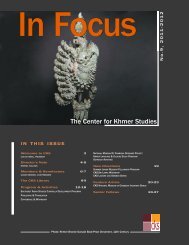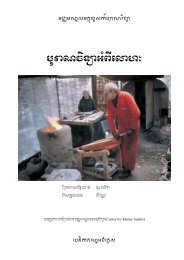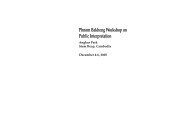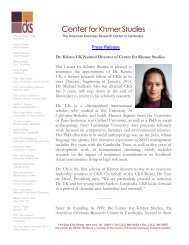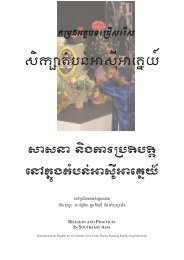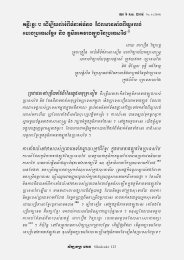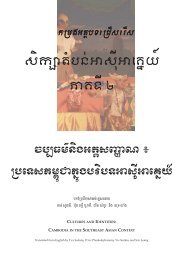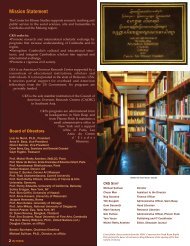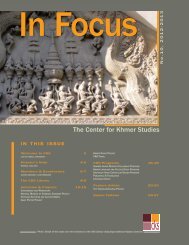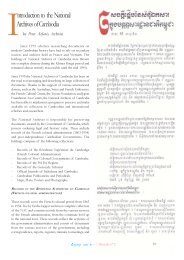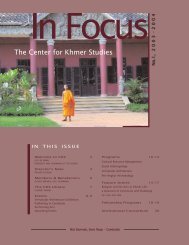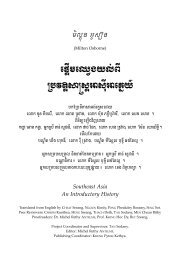Mission Statement - Center for Khmer Studies
Mission Statement - Center for Khmer Studies
Mission Statement - Center for Khmer Studies
You also want an ePaper? Increase the reach of your titles
YUMPU automatically turns print PDFs into web optimized ePapers that Google loves.
The Junior Faculty Training Program (JFTP)<br />
Since the last In Focus update, two more Junior Faculty<br />
Training Program (JFTP) sessions have been successfully<br />
completed. The first session in the second year of the<br />
Rockefeller Foundation funded program focused on ‘The<br />
History of Modern Southeast Asia’. This session was led by the<br />
eminent Professor of History from Thailand, Charnvit<br />
Kasetsiri, Thammasat University, Bangkok, and was attended<br />
by 15 more junior faculty from various Phnom Penh<br />
Universities. Prof. Kasetsiri continued with the tried and tested<br />
<strong>for</strong>mat of weekly academic seminars, a regional study<br />
tour, followed by supervised individual research projects, all<br />
conducted over a six month period. Prof. Kasetsiri’s session<br />
had a particular focus on the concepts of nation-state building<br />
and nationalism in the region. This was particularly<br />
poignant as the session took place at a time of heightened tension<br />
and military standoff, in the dispute over the Preah<br />
Vihear temple between Cambodia and Thailand. The dispute<br />
continues to arouse considerable nationalist fervor in both<br />
countries.<br />
Prof. Ben Anderson with CKS participants<br />
The session was also privileged and honoured to have two<br />
distinguished guest speakers give lectures to participants.<br />
Benedict R. Anderson, the Aaron Binen Korb Professor of<br />
International <strong>Studies</strong>, Emeritus Cornell University, gave talks<br />
on the concept of nationalism to the session participants at<br />
the CKS office in Phnom Penh. Prof Anderson’s hugely influential<br />
book Imagined Communities: Reflections on the Origins<br />
and Spread of Nationalism (Verso, 1983) has been translated<br />
into 24 different languages. The session also warmly welcomed<br />
the Honorable Benny Widyono a retired senior United<br />
Nations diplomat and CKS board member. Dr. Widyono’s<br />
book Dancing in Shadows: Sihanouk, the <strong>Khmer</strong> Rouge, and the<br />
United Nations in Cambodia (Rowman & Littlefield, 2008) is an<br />
important first hand account of his role during Cambodia’s<br />
political transition beginning in 1992, first as the United<br />
Nations Transitional Authority (UNTAC) de facto governor of<br />
Cambodia’s North West province, Siem Reap, and second the<br />
United Nations Secretary General’s Special Representative <strong>for</strong><br />
Political Affairs in Cambodia. Benny had a front row seat in<br />
the post-UNTAC period political drama leading up to<br />
Cambodia’s 1998 parliamentary elections. Both speakers<br />
made an invaluable contribution to understanding recent historical<br />
events in Cambodia.<br />
In April, the second session focusing on Political Science got<br />
underway. This session was led by Dr. Eric Haanstad, from<br />
the <strong>Center</strong> <strong>for</strong> South East Asian <strong>Studies</strong>, University of<br />
Wisconsin—Madison. Eric is an interdisciplinary scholar by<br />
training, and brought a holistic perspective to his session,<br />
in<strong>for</strong>med by political science, anthropology and Southeast<br />
Asian studies. Topics of inquiry focused on the cultural<br />
dimensions of political expression, states, bureaucracy, warfare,<br />
colonialism, counter-expression, borders, underground<br />
economies, and patterns of globalization. The session<br />
explored ethnographic approaches to political science, particularly<br />
the cultural construction concept, as it applies to political<br />
phenomenon. It combined research exercises, individual<br />
presentations, theoretical and thematic readings, lectures and<br />
group discussion to explore this thematic intersection.<br />
Publishing and Translation<br />
In the space of five short years CKS has earned a reputation<br />
<strong>for</strong> the production of high quality publications, and English<br />
to <strong>Khmer</strong> translations of academic books and articles. The<br />
<strong>Center</strong> continues to publish new and relevant material on<br />
Cambodia and Southeast Asia, such as our annual peer<br />
reviewed journal Siksacakr highlighting new trends in<br />
<strong>Khmer</strong> <strong>Studies</strong>; and publications that arise out of CKS<br />
research projects and selected conferences; and new research<br />
materials and monographs providing vital and updated<br />
research in the social sciences and humanities. These achievements<br />
are testament to the commitment and perseverance of<br />
everybody involved in overcoming the considerable difficulties<br />
and complexities of translating English academic texts<br />
into the <strong>Khmer</strong> language.<br />
Building on this achievement in 2009, the <strong>Center</strong> was thrilled<br />
to present its latest offerings. Professors Kamaleswar<br />
Bhattacharya and Karl-Heinz Golzio’s A Selection of Sanskrit<br />
Inscription from Cambodia, was published in April. Dr. Milton<br />
Osborne’s book Southeast Asia: An Introductory History was<br />
launched in June. Milton put in a personal appearance at the<br />
Australian <strong>Center</strong> <strong>for</strong> Education in Phnom Penh, explaining<br />
the origins of his book, which including this <strong>Khmer</strong> language<br />
version, has been translated into nine languages, and answer-<br />
18 IN FOCUS



